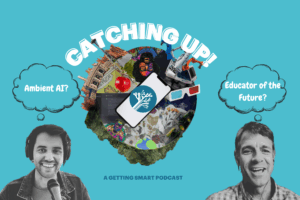Audience
Saylor Foundation Announces Multi-Million Dollar Open Textbook Challenge
The Saylor Foundation, a non-profit Free Education Initiative, announced Tuesday that it launched Wave II of its multi-million dollar Open Textbook Challenge (OTC), aimed to complement and expand its more than 200 free, college-level courses. The Saylor Foundation's open and free compilation of college-level textbooks provides textbooks to students who seek a higher education, yet face monetary or geographical barriers.
Staff Picks: Danny Glover, Games for Learning, & the Virtual School Symposium
This was a busy week for the Getting Smart team! For this week's staff picks, Karen chose an article about Danny Glover at the 'Freedom Awards,' Caroline picked an article highlighting the ways games can transform schools, and Sarah picked the great iNACOL conference this week!
OERu: Open Content to Expand College Access
OERu seeks to create new affordable learning pathways for low income adults worldwide based on open education resources (OER). Sponsored by the OER Foundation and Hewlett Foundation, the work is advanced by 13 partner institutions including Empire State, SUNY.
Staff Picks: Big Data, OER, Teacher Professional Development
Tom picks "BIG data" this week. Karen picks the article "The State and OER" on the new OER programs in Washington State while Caroline picks the article "Sacramento mayor, former NBA star Kevin Johnson in Tacoma tonight." Sarah picks the article "Digital Age Teacher Council Outlines Teaching Transformation."
Has the OER Tipping Point Arrived?
Free and Open Educational Resources (OERs) are taking off. In the last two weeks, we’ve seen some major developments from some of the most influential players in education, Pearson and Blackboard. The market is shifting to open. Yet, has the tipping point arrived?
The race to platform education
Across the full spectrum of education – primary, secondary, and higher – we are witnessing a race to develop platforms for content, learning, teaching, and evaluation. As liberating as the web is, tremendous centralization of control is occurring in numerous spaces: Google in search/advertising/Android, Amazon in books/cloud computing, Facebook in social networks, etc. I use a smaller range of tools today than I did five years ago. And the reason is simple: companies are in a landrush to create platforms that will tie together previously disconnected activities and tools.
Finance For Future Generations
Brian Page By Brian Page “All the perplexities, confusion and distress in America arise not from defects in their Constitution or Confederation, nor from want of honor or virtue, so much as downright ignorance of the nature of coin, credit, and circulation.” – John Adams On the…
Teaching Math Without Words—And Getting Big Gains
Mathematical thinking is a problem-solving skill but we use a lot of abstract symbols and words to try to teach kids math procedures. Just look at a textbook or observe a middle school classroom. Our text-based approach works for some students but is confusing and complicated for too many,…
Get out the blender, kids
I think I have just glimpsed the future, or at least what could be the future, of public education. I’m talking about the effective use of today’s technology to enhance learning, or what insiders are calling ‘blended education.’ Michael Horn, a co-author of Disrupting Class, provided a definition: Blended learning is any time a student learns at least in part at a supervised brick-and-mortar location away from home and at least in part through online delivery with some element of student control over time, place, path, and/or pace.
Good Work: People That Can Do No Other
Jay Kimmelman moved to Africa to launch Bridge Academies I love people that do what they do because they can do no other. You can see it in their clarity, persistence, and the ability they say no to the BS most of us put up with. In some…


